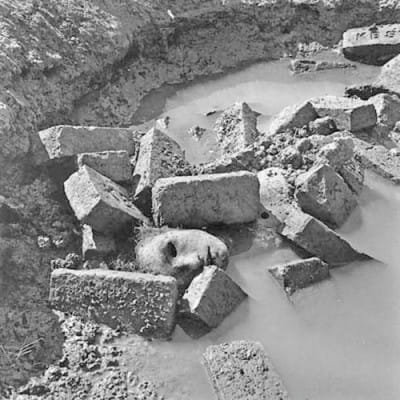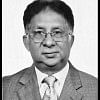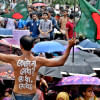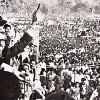Pakistan still in denial and self-deceit

It was a day that shall remain indelible in my memory for as long as I live. It happened in Chittagong on April 11, 1971.
Having already revolted against the Pakistan government on the midnight of March 25 in the face of the murderous assault by its army on the freedom loving people of Bangladesh, I, then a lieutenant in the army, was engaged on that day in fierce defence of the strategically located Kalurghat Bridge on the Chittagong-Cox's Bazar road. The 25 Frontier Force Regiment of the Pakistan army was advancing towards the bridge, aiming to capture it. We, the freedom fighters, were vastly outnumbered and seriously ill-equipped. But we were determined to resist the advance for as long as we could. In the height of the battle, I was hit; a bullet from the advancing Pakistan army unit pierced my body as it entered through my left thigh, passed through the lower abdomen and shattered my right hip. Seriously wounded and bleeding profusely, I was taken prisoner by the Pakistanis.
This story is not about the battle. Nor is it about my injury. It is about genocide, about crimes against humanity.
As I was placed on a Pakistani military jeep, my hands tied and my body in agonising pain, I was made to witness a spine chilling act of brutality that could have served as a script for Serbia's Milosevic's ethnic cleansing pogrom of Bosnian Muslims.
Close to the scene of the battle was a cluster of mud huts whose occupants had provided us support and encouragement leading up to that fateful day. From my position as a captive, I saw members of the Pakistan army drag out the male members from the huts, tie them up with their hands behind their backs, make them sit down in a circle with their back towards each other and then proceed to shoot them in their head at close range. One by one, their heads rolled to a side in death as each bullet hit its desired target, blood sprouting from each shattered skull. What was even crueler was that just before carrying out this act of collective execution, the Pakistani soldiers asked the women folk, wives, mothers, sisters and daughters, to stand there and watch the whole gruesome act in silence. They were not even allowed to shed tears for their dead.
From where I was in the military jeep, I witnessed the whole episode as it unfolded right before my very own eyes; the pang in my heart accentuated the pain from my battle wound. This was crime against humanity in full display, planned with precision and executed in cold blood. The victims were unarmed civilians whose only wish was freedom from tyranny and liberation from occupation.
Those were the early days of the Liberation War. During the 262 days of Pakistan's military occupation of Bangladesh in 1971, such scenes of genocidal acts were played out over and over again in towns and villages all over Bangladesh, resulting in deaths of thousands, hundreds of thousands. Many of these gruesome killings have been recorded in numerous books and publications, some even by Pakistanis themselves. And yet, more than four decades on, the present day government of Pakistan has unabashedly and deliberately chosen to deny history. This is not just shameful; it is infinitely more immoral.
By its denial of the crimes against humanity committed by its military in Bangladesh in 1971, the Islamabad government has demonstrated brazen arrogance and utter ignorance. It seems that the Pakistan Foreign Office has not even bothered to check existing records before taking such a self-defeating step. If it did, it would have seen that at the Tripartite Agreement reached between the governments of Bangladesh, India and Pakistan in New Delhi in April 1974, Pakistan's then Minister of State for Defence and Foreign Affairs Mr. Aziz Ahmed, while accepting the acts of genocide and crimes against humanity committed by the Pakistan military, said: "his government condemned and deeply regretted any crimes that may have been committed". The same agreement also states "that following recognition (of Bangladesh by Pakistan), the Prime Minister of Pakistan had declared that he would visit Bangladesh in response to the invitation of the Prime Minister of Bangladesh and appealed to the people of Bangladesh to forgive and forget the mistakes of the past. The latest act by the Government of Pakistan, therefore, is a denial of the letter and spirit of the Tripartite Agreement to which Pakistan is also a signatory.
One also watched in utter disbelief as members of Pakistan's Parliament spoke in virtual defence of the crimes against humanity committed by their military in 1971. When one heard Imran Khan do the same, it was clear that his prowess in the cricket field has not accompanied him to the field of politics and has deserted him completely when it came to the killing fields of Bangladesh.
It may be recalled that relations between states are fundamentally relations between the people of the states. By denying the acts of crime against humanity, the Pakistan government has shown total disregard for the sentiments of the people of Bangladesh. In the process, it has risked fundamentally disfiguring the form and substance of the ties between the two states.
The one redeeming part in this whole episode is that there are those in Pakistan like Asma Jahangir, Ayesha Siddiqui, and countless others, who have not hesitated to express their disgust at the action of their government. They find Islamabad out of touch with reality. Clearly, neither Pakistan's lawmakers nor its government are in sync with the people of Pakistan. If anything, the disconnect is palpable.
We all know what Islamabad did. The question that warrants a serious search for an answer is why and why now?
The writer is a decorated freedom fighter and a former Foreign Secretary of Bangladesh.

 For all latest news, follow The Daily Star's Google News channel.
For all latest news, follow The Daily Star's Google News channel. 








Comments